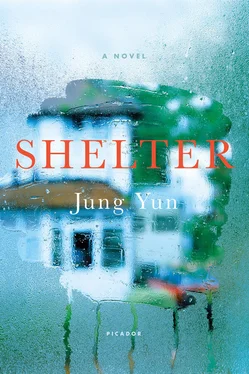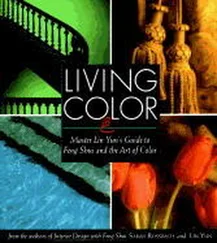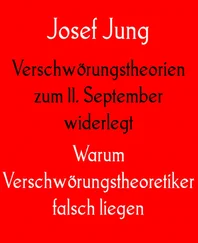“Excuse me. Could I get by, please?” Vivi brushes past, carrying a large silver tray. She sets it on the end table and pours three cups of coffee, careful to avoid any eye contact with Kyung. Like Gillian, she has no makeup on, and she’s still wearing pajamas. Her hair, which was so perfectly coiffed last night, has deflated like a balloon. Everyone looks ugly this morning.
“Will one of you tell me what’s going on?”
Gillian and Vivi both turn to Connie, who now has his back to them. He keeps saying, “I see, I see,” and then occasionally, “I understand.”
“Who’s he talking to? Where’s everyone else?”
As soon as Kyung mentions the others, he realizes who’s present and who’s not. And despite the lightness of his mood only minutes earlier, something wraps him tight in its grip, stopping the blood to his heart.
“Where’s Ethan? What happened to Ethan?”
“Lower your voice,” Gillian hisses. “He’s right outside.”
Kyung runs to the window, searching for proof that Ethan is where she says. He spots him near the steps to the beach, crouched on all fours while examining something in the sand. Kyung has no regrets about last night except for one. He wishes he hadn’t snapped at Ethan about the lobster; he wishes he’d had the sense to send him to his room. He’s relieved to see him no worse for the wear, dressed in swim trunks and chatting happily about the animal or insect he’s just discovered. Jin is standing beside him, his attention clearly divided between his grandson and the house, which he keeps looking up at. When he notices Kyung in the window, the distance between them fails to soften the expression on Jin’s face. It’s the same look that Gillian gave him, the one that says everything is different now, that there’s no going back to what was before.
Connie motions for a pen, which Vivi springs from her seat to give him. He writes something on his hand and thanks the person on the other end.
“Come on,” he says to Kyung. “We have to go.”
Gillian and Vivi crowd around him for an explanation, but Connie waves them away. “Later,” he says, grabbing his keys and heading toward the door. “I’ll know more later.”
Kyung follows him outside, not certain where they’re about to go, or why Connie is calling Jin over. “Will you tell me what’s going on?”
“Mae and Marina were in an accident.”
“When? Where?”
“This morning. Not far from here, I think.”
Jin sends Ethan into the house and joins them in the driveway.
“The police found them,” Connie says. “They were in an accident off Route 28. You know where that is?”
Jin is sweaty from standing in the sun for too long. When he nods, his glasses almost fall off his nose. “Are they hurt?”
“I’m sure it was nothing. They just can’t release any details on the phone.”
The three of them climb into the Suburban — Connie and Jin in front, Kyung in back. As soon as Kyung puts on his seat belt, he feels an uncomfortable pressure against his bladder, but it’s too late to stop for the bathroom now.
“How did this happen?” he asks.
“They must have taken your car this morning before everyone got up.”
The Suburban bounces along the gravel, shaking Kyung like a loose marble in the backseat. He clutches the door handle to steady himself, trying to make sense of what he just heard.
“I don’t understand,” Jin says. “Marina doesn’t drive.”
“Apparently, Mae was the one driving.”
“But she can’t drive either. There must be some mistake.”
“I taught her,” Kyung says quietly, not certain if he’s admitting or explaining.
“You did what?”
“She asked me to. She wanted to learn, so I taught her.”
“So she can handle a car, then?” Connie asks. “She knows what she’s doing?”
Kyung isn’t sure how to respond. “We only practiced that one time.”
Jin glares at him in the rearview mirror. “You did this,” he says. “You and your drunk ranting last night … in front of your own child, in front of our guests. You have no respect for anyone. That’s why your mother and Marina left this morning. You think those two haven’t been through enough without you making more trouble?”
“You’ve done a thousand times worse in front of me.”
“Children are supposed to honor their parents.”
“And parents are supposed to take care of their children.”
“You ungrateful little—”
“Grateful for what ? What exactly should I be grateful for?”
“Enough,” Connie says. “I can’t think with the two of you shouting in my ear.”
Kyung is about to continue when Jin leans forward in his seat and points at a small marker approaching on the side of the road. “There,” he says. “That’s where you want to turn. Right there.”
The change in direction takes the air out of their argument. The three of them sit silently as they join a narrow two-lane highway that winds through a residential area, a homelier part of Orleans that reminds Kyung of the Flats. The houses they pass are modest. Small and untended and built up right along the side of the road, with no view of anything worth seeing. He assumes this is where the real people live, the ones who work the cash registers and wait on tables and bag groceries for the vacationers who invade every summer. He watches their rusty cars and yards filled with garage-sale junk pass through his window, wondering where Mae and Marina thought they were going. There aren’t any stores in this area, and if they needed a pretty drive to clear their heads, this wasn’t the right place to do it.
“Dickinson Farm Road,” Connie says. “That’s the cross street they gave me. How far is that from here?”
“Not far. But why would they be in this part of town?” Jin asks.
Kyung assumes that Mae got lost and flustered. He taught her to drive in circles, not to find her way home. “She was a fast learner,” he says, if only to reassure himself.
They follow the highway for a few miles until traffic begins to slow, then crawl, then simply stop. The car in front of them is a pickup truck with a noisy exhaust and too many bumper stickers. The driver is hanging his sunburned arm out the window, drumming his fingers impatiently on the door. In front of him are at least two dozen cars, and possibly dozens more after the wooded curve they can’t see around. They sit in traffic for several minutes, not moving an inch until Connie suddenly cranks his wheel and pulls over onto someone’s yellow scrap of lawn.
“We should get out and walk,” he says. “We’re not going to get any closer driving.”
Everyone they pass seems angry and annoyed, which worries Kyung. When Connie said there was an accident, he assumed it was a fender bender, something inconvenient but insignificant. He imagined cuts and stitches, a cast or concussion at worst. But the farther they walk, the clearer it is that the accident was something more. A woman in the passenger seat of a vintage Beetle is smoking a skinny brown cigarette. The ground beneath her open window is littered with butts. Most of the drivers have their engines turned off to conserve gas, as if they lost hope of moving a long time ago. When they round the curve, Kyung sees the flashing red, white, and blue of emergency vehicles in the distance — too many for just a minor accident. It looks like the Fourth of July. He breaks into a sprint, kicking up a cloud of dust while the others trail behind him.
There’s a crowd gathered in front of a faded gray house, packed tightly with neighbors and kids, all standing on tiptoes to catch a glimpse. Kyung is so winded by the time he reaches them, he has to rest his hands on his knees until Connie and Jin catch up. He hears someone breathing heavily alongside him, and then feels a tap on his shoulder as Connie begins to trudge through the crowd, waving his badge at people too distracted to care. The flash of silver and gold is enough to clear a path for them toward an area cordoned off by hazard cones and tape. Kyung’s stomach sinks when he sees his car being towed away from a huge tree, the entire front end crushed like an accordion. Both air bags have deflated. Jagged outlines of glass are all that remain of the windshield and windows. There’s no sign of his mother or Marina. No ambulances on the scene. Only a swarm of police cars and the tow truck driver. Connie tells him to stay put and climbs over the tape, lifting his badge to approach two officers standing near the tree.
Читать дальше












